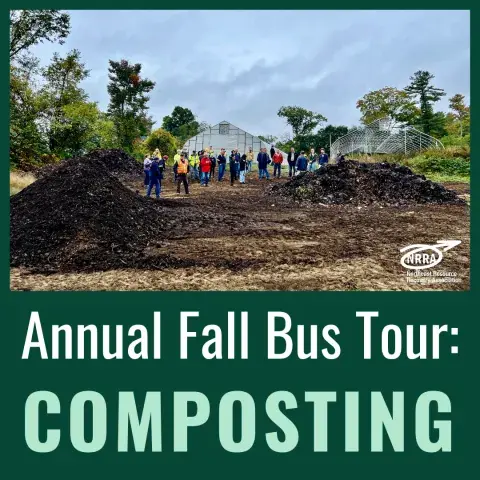
On September 25th, nearly 40 NRRA Member Solid Waste Facility Operators, along with some NRRA staff, headed out on the Annual Fall Bus Tour, this time focused solely on composting in the Granite State. The tour began with a visit to the composting operation at WorkSong Fam in Hopkinton, NH, where residents can bring their food scraps free of charge to be composted and used on site. We then continued to New London, where they ran a successful pilot program and now collect food waste at their municipal transfer station and send it through Renewal Compost - a commercial composter. Finally, the tour ended in Lebanon, where food scraps are accepted at their large facility, processed onsite, and then the compost created used on the limited service landfill and soon by the town.
In a follow up survey, it's clear the bus tour was a success! One operator said it best:
"Overall it was very enjoyable! The pace of the whole thing was extremely fluent, starting off with small scale local community farms, then a bigger town wide transfer station working with the people, and ending with a larger scale transfer station that in a way incorporated everything that we had previously seen into their everyday tasks."
Stop 1: Work Song Farm in Hopkinton, NH
Work Song Farm is owned and operated by Dan and Abby Kilrain. It is a small-scale farm that produces diverse vegetables, herbs, and flowers on three acres in Hopkinton, New Hampshire. In support of their local community, excess produce is donated to local food pantries and soup kitchens.
On-site food scrap composting is done through a bucket system, where participants can pick up empty buckets at the farm and return full buckets. Food scraps only, no paper products or other compostable single-use items are accepted.

The food scraps are dumped into a specially-designed orange container that Dan can use to both transport the food scraps as well as scoop and turn the compost piles. In the orange container, Dan included a rotating sprinkler that participants can use to rinse out their bucket. It has the added benefit of adding a bit more water to the food waste, which Dan explained can be beneficial to the composting process.

As participants checked out the steaming piles, which are used on the garden beds, Dan illustrated how hot the piles get with a 3-foot thermometer, which quickly reached 150ºF. The on-farm composting mostly services Work Song Farm's CSA participants and Hopkinton residents within a 5-mile radius to the farm.
Stop 2: Transfer Station in New London, NH
We managed to beat the rain (just a bit) with an initial stop by the New London Transfer Station to check out the food waste collection site. Six 64-gallon totes are housed within wood collection boxes that were originally designed to help keep out bears and other critters. As it turns out, bears are quite smart and figured out how to open the boxes and totes (without breaking them!) to have a snack. After consulting with a local biologist, they now spray ammonia around the barrels daily, which has kept the bears and their buddies away!

Following the stop at the Transfer Station, the bus drove to a local church for a presentation by Liz Meller, of the New London Waste Reduction Committee, as well as DPW Director, Sam Clarke, and Transfer Station Supervisor, Kenny Waldo, led by NRRA's Communications Manager, Andrea Folsom (all pictured above).
Composting in New London was sparked by overwhelming support of a simple question about composting included in the 2020 update of the town's Master Plan. After exploring options including on-site composting and farm-community grants, the town was able to work out an agreement with Renewal Compost to collect and manage their food waste. Their pilot program began in October 2022 and by April 2023, the twenty participating households had diverted 3 tons of food scraps. The program was then expanded by Town Warrant in March of 2023 to 140 more households and within the weeks leading up to the bus tour, the Transfer Station went from 4 totes to collect food waste to 6 due to the program's popularity. While the numbers are not in quite yet, and the program did cost more money than it saved to date, Sam did report that fewer municipal solid waste (MSW) loads were sent to the landfill than in past summers. With no change to the population (the summer was beautiful and bustling!) the only thing that has changed was the implementation of the food waste diversion. While correlation is not causation, they are cautiously optimistic!
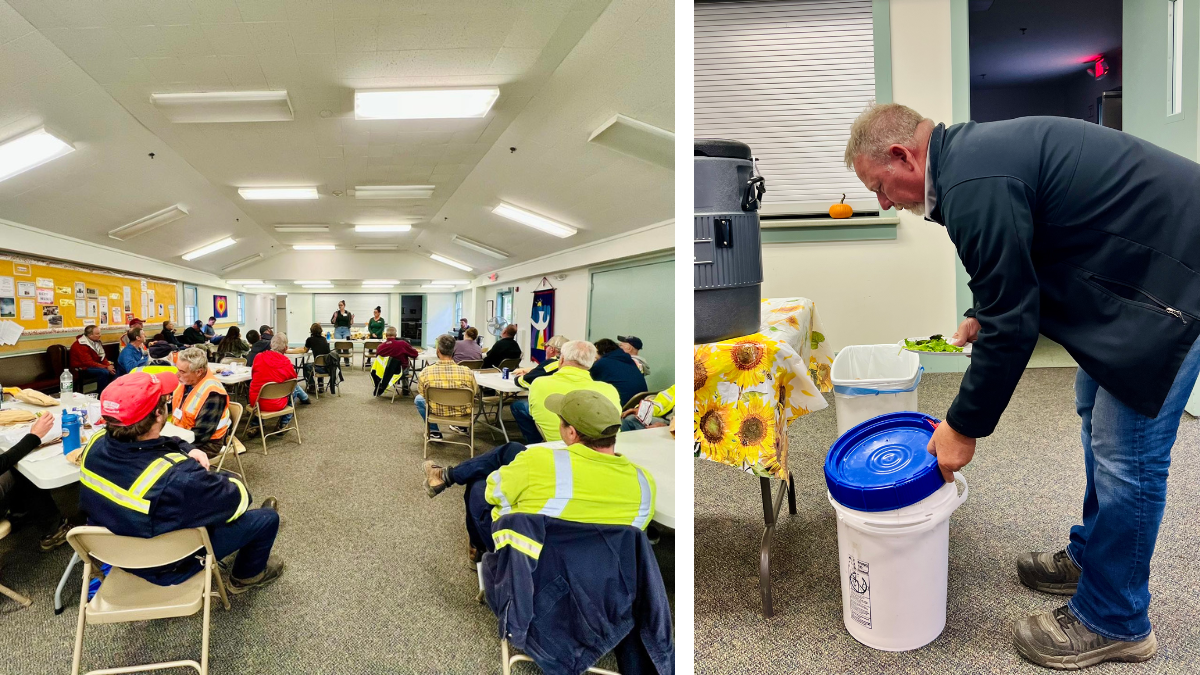
Everyone enjoyed subs from the local Pizza Chef (and of course, there was a bin for any leftover food scraps, which was composted through Work Song Farm). We also heard from NH Department of Environmental Services about their upcoming grants, which will focus in part on composting and food waste diversion in NH. NRRA will be sure to share more on these grants once the information is available!
Stop 3: Lebanon Landfill in Lebanon, NH
Our final stop was at the Lebanon Landfill, where Transfer Station Manager, Erica Douglas, explained about the food waste drop-off program during our tour.
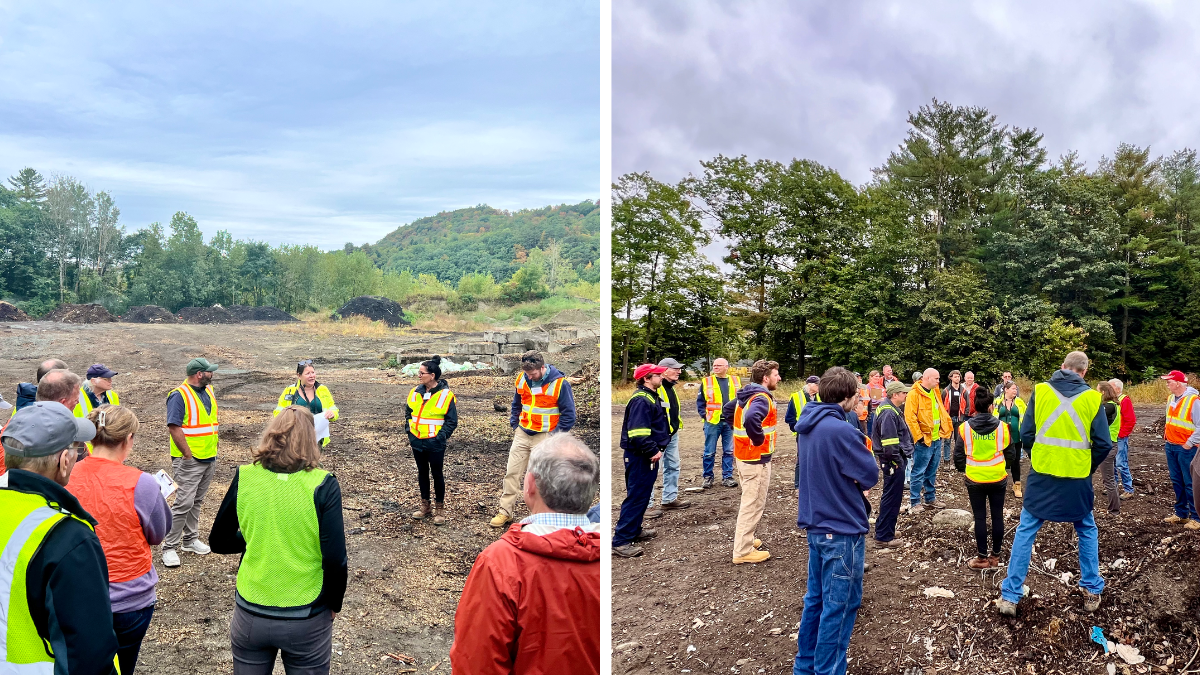
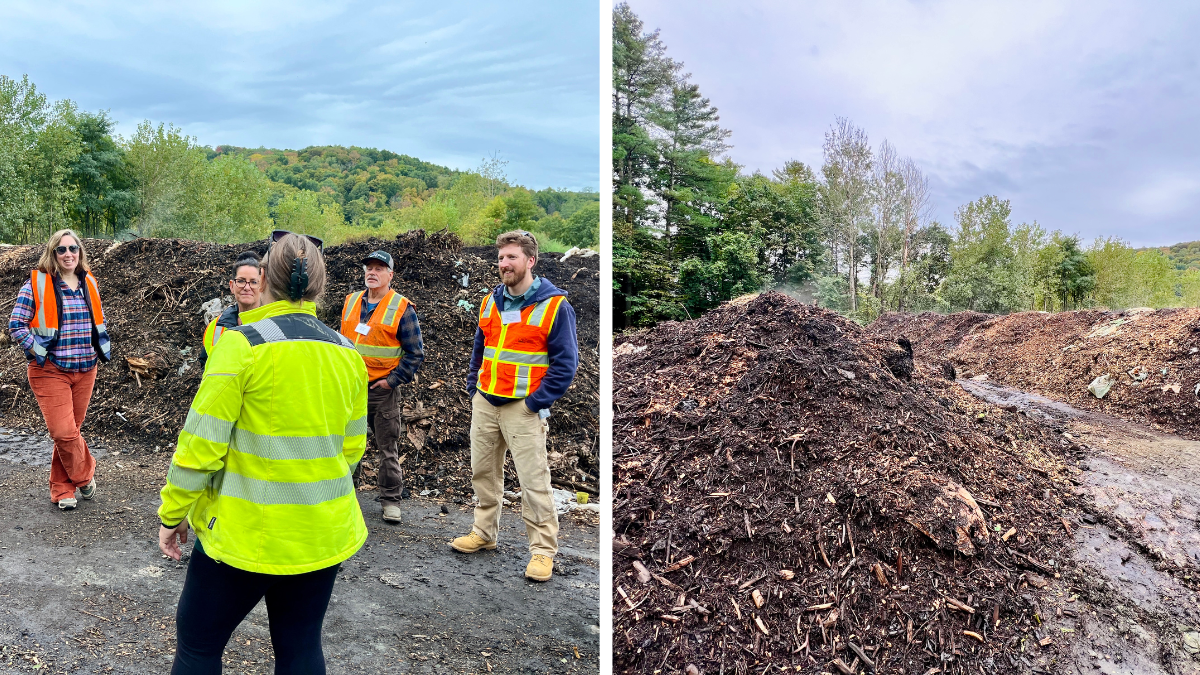
Food scraps are composted on-site in long windrows. This program became free for anyone with a Lebanon solid waste permit in 2023. Food scraps are placed in a blue food waste dumpster and then added to the windrows, along with manure and other brown matter. As the program has grown in popularity, so has the size and number of windrows, which now take a full-time staff member to manage. They have also started using thermometers that take automatic readings every 15 minutes to better manage timing the turning of the piles (shown below, left - the red box).
The finished compost used onsite at the landfill for erosion control (shown below, right). By using the compost on-site, the use of virgin soil products is avoided. Additionally, landfill capacity is saved by diverting the food waste out.
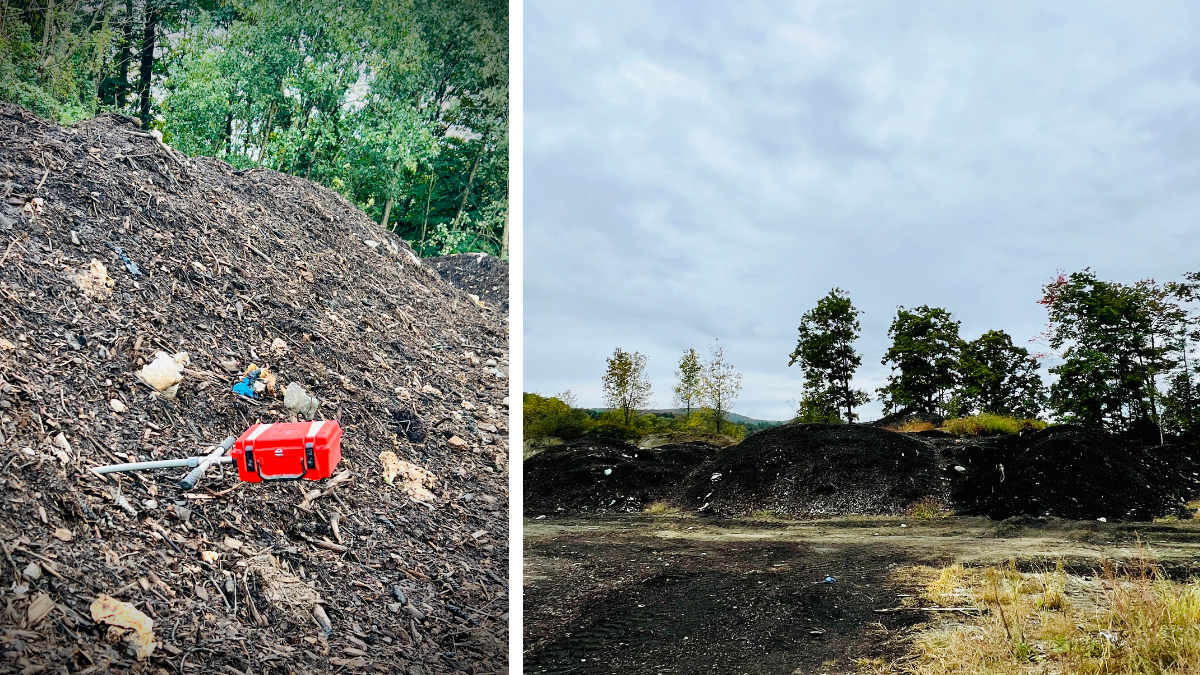
With a bit of time remaining, after touring the composting program, Erica led the group to check out the recycling center. Participants were eager to see the horizontal bailer, ask about the purple pay-by-bag program, and check out storage and management. Each opportunity to visit another transfer station gives operators new ideas on how to change or improve their own facility, or to share their suggestions with one another.
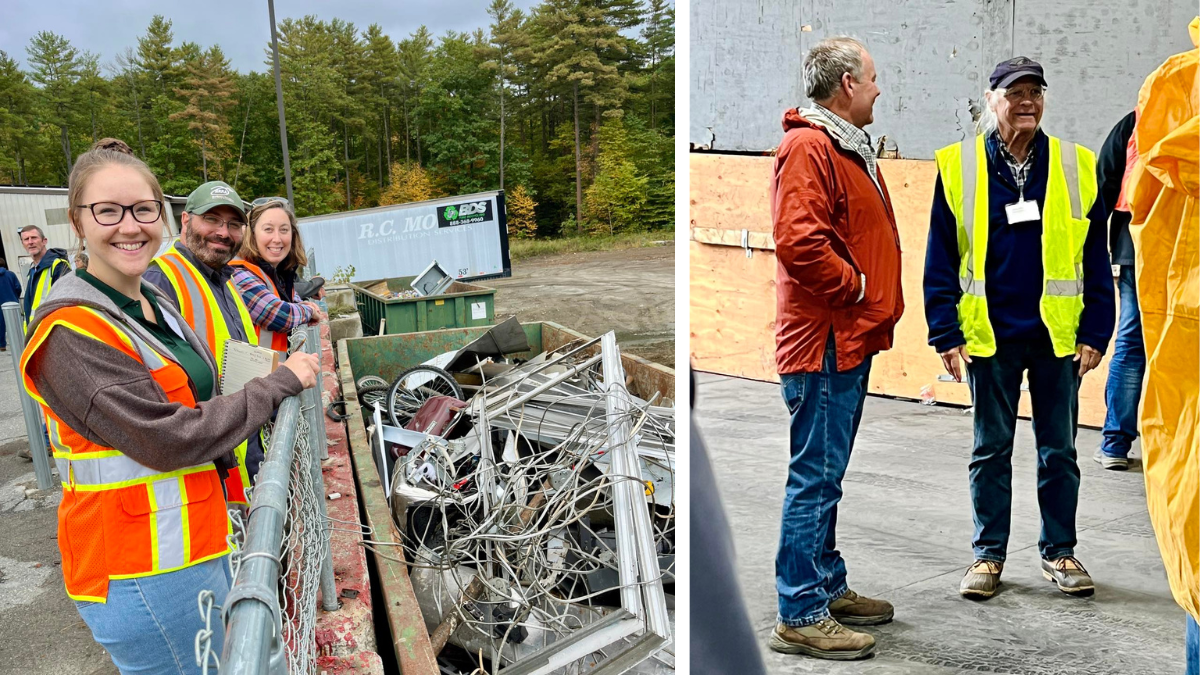

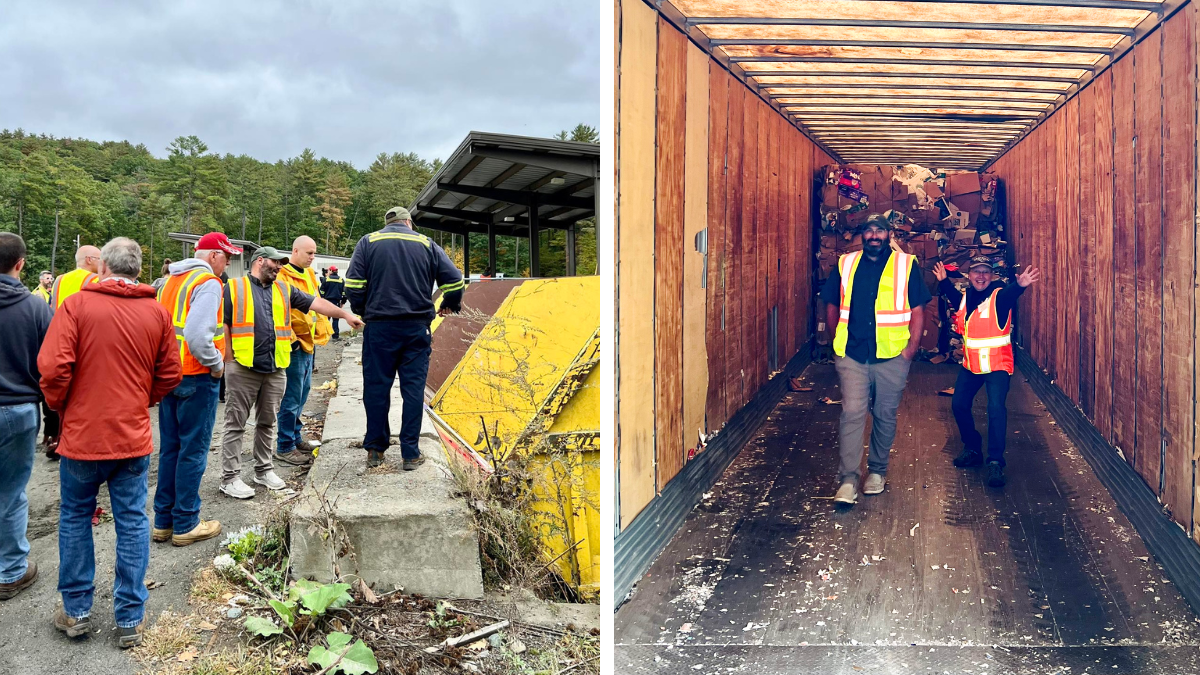
The progression from the small on-farm composting all the way up to the large-scale facility composting was enlightening to all participants and allowed for many questions and much discussion along the way. In the end, after a full day of learning and networking, the long bus ride home was a quiet one with many participants nodding off, no doubt dreaming about the next bus tour in 2025!
This material is based in part upon work supported under a grant by the Rural Utilities Service, United States Department of Agriculture. Any opinions, findings, and conclusions or recommendations expressed in this material are solely the responsibility of the authors and do not necessarily represent the official views of the Rural Utilities Service. Rural Community Assistance Partnership, Inc., is an equal opportunity provider and employer.
